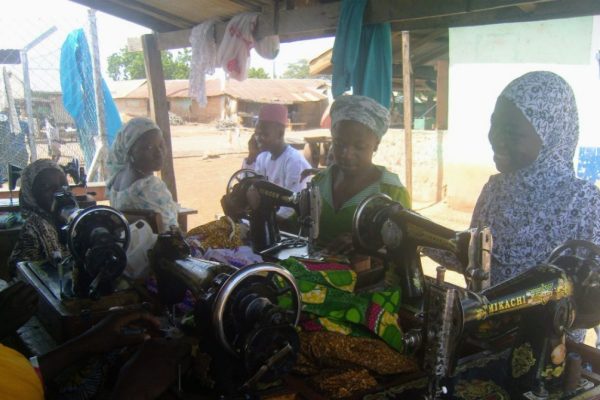All over the world, COVID-19 is having an unimaginable impact on families, businesses, Civil Society Organisations (CSOs), among others which have brought untold suffering and rapidly eroded gains made by key national and regional health actors such as YOVI’s efforts on girls’ access to livelihood, contraceptives and other SRH services in many districts. Schools have closed down due to the impact of the pandemic and young people, particularly girls (both in and out of school) are greatly affected. Young girls suffered teenage pregnancy, unsafe abortion, child marriage during the lockdown in access to basic necessities.
With funding support from Girls Not Brides (GNB), Global Partnership to end Child Marriage, the project commenced June 2020 to provide support to poor families in selected communities of Northern Region, Ghana. Currently working with the GNB, Ghana National Partnership at zonal levels with child protection & safeguarding officers across all three zones in Ghana, the project seeks to ensure that young people, particularly girls’ needs are addressed in these trying times.
Key activities of the project include but not limited to:
a. Provision of nose mask. As part of the project, nose masks were produced and currently being distributed to poor households, particularly women and girls in four communities of Tolon District namely Baaduli, Yapala, Tolon township, and Woribogu respectively.
b. Distribution of food items. Carefully selected beneficiaries from four communities are receiving food items in Tolon District. These are basically groups YOVI and other stakeholders have been working with. The selection was done together with the District Department of Social Welfare and Community Development, Honourable Assembly Persons in the various communities, and YOVI supporting staff. The category of beneficiaries comprised of young girls, single mothers, nursing mothers, among others. This was to help cushion poor families that were hard hit by the COVID-19 pandemic and its effects.

c. Production and printing of IE&C materials. To enhance sensitization activities at the community level, Information, Education, and Communication (IE&C) materials have been printed for distribution. Beneficiaries are receiving education on COVID-19 safety protocols and are being directed to use Ghana Health Service emergency numbers on the poster stickers for assistance, and in case of suspected symptoms.
d. Radio discussions. As part of creating awareness and addressing myths associated with pandemic and enhancing wider coverage, radio discussions are ongoing at various airwaves to ensure wider coverage and benefit.

Amidst all these, parental irresponsibility is harnessed as most critical in these times based on the major premise that primary socialization is the hallmark for the effectiveness of secondary socialization, and these social virtues are observed to be fading, especially at the primary levels (homes). Again, issues of child marriage featured prominently in all discussions as a violation of children’s rights to health, protection, and education, and thus truncating the livelihood skills development. Male rationalization of their shirking responsibility, the culture of voicelessness of women and girls, women’s tendency to internalize their feelings and social challenges for fear of male stereotype view of assertiveness as signs of disrespect for men featured pathetically. On the other hand, community members are pledging to use self-initiated sensitization with posters to scale up the activities at their respective homes, paste poster stickers at vantage points for public consumption, visit health facilities regularly for a checkup in the event of suspected symptom or cases, monitor children to ensure they frequently wash their hands before and after eating and when going to bed and finally, to address myths associated with the pandemic to allay fears and overcome negativities related to the COVID-19 pandemic.
For more information or updates on this project or Girls Not Brides (GNB), Ghana Partnership, please visit our social media handles: Facebook, Instagram, and Twitter or call us on +233 3720 20272/247 588466 or visit our office @ 2nd Floor, Yamusah Plaza, Education Ridge Road, Tamale-Ghana.












